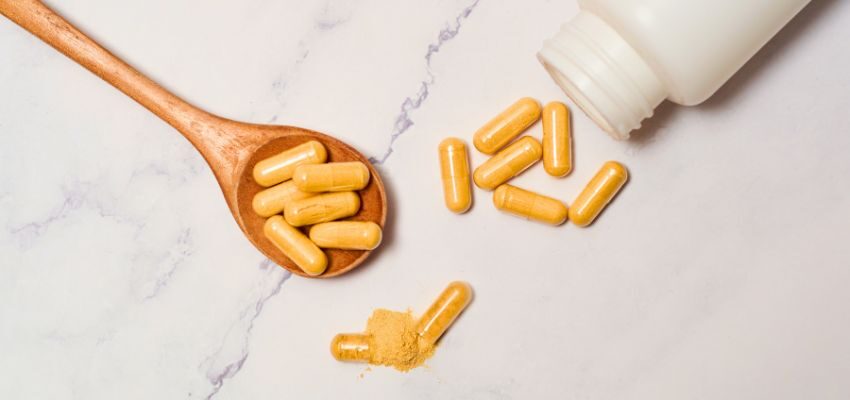Probiotics For Bloating: What You Need To Know

Published June 17, 2025
Feeling bloated again? That uncomfortable, heavy, gassy sensation can quickly ruin your day and leave you searching for answers. Bloating is a common issue, but did you know that your gut health could be the underlying cause? Here’s the good news: probiotics for bloating might be the key to finding relief. These beneficial bacteria in your gut can help alleviate discomfort and restore your digestion to normal. Curious how?
In this article, we’ll explore the causes of bloating, the role of probiotics, and practical tips to help you manage this common concern.
What Is Bloating?
Bloating is the sensation of swelling or fullness in the abdomen. It’s often caused by excess gas or air in the gastrointestinal (GI) tract. Some people feel like they’ve overeaten, while others notice a visibly swollen and tight abdomen.
Accompanied by pain and discomfort, bloating is more than a minor annoyance—it can significantly impact daily life.
Common Causes Of Bloating
Bloating can stem from a variety of factors, including diet, lifestyle, and underlying health issues. Here are some of the most common causes:
- Gas build-up: During digestion, gas is naturally produced as a byproduct of the process. However, an imbalance in gut bacteria can trigger excessive gas, resulting in uncomfortable bloating.
- Unbalanced diet: Diets low in fiber or high in processed foods can disrupt gut health and contribute to bloating.
- Food intolerances: Sensitivities to foods like dairy, gluten, or FODMAPs (fermentable oligosaccharides, disaccharides, monosaccharides, and polyols) can cause bloating. They may also lead to digestive discomfort.
- Stress: High stress levels can impact digestion due to the strong connection between the gut and brain, which can lead to bloating.
- Hormonal changes: Hormonal fluctuations can lead to bloating. This is common during menstruation or menopause.
- Underlying health conditions: Persistent bloating may be a sign of underlying issues. It can be linked to irritable bowel syndrome (IBS), small intestinal bacterial overgrowth (SIBO), or gut dysbiosis. These conditions need medical attention.
Understanding these common causes can help identify the root of the problem and guide you toward practical solutions.
How Gut Bacteria Contribute To Bloating
The gut microbiome is an intricate ecosystem comprising trillions of bacteria. It helps with digestion, nutrient absorption, and defense against harmful pathogens. When this balance is disrupted, it’s called dysbiosis. The condition can lead to issues like excess gas and bloating.
Certain gut bacteria break down fiber and carbohydrates. An imbalance can disrupt this process. This may cause excessive gas, resulting in bloating and flatulence.

The Importance Of Probiotics For Gut Health
Probiotics, or “good bacteria,” are live microorganisms found in your gut. They’re different from harmful bacteria. These beneficial microbes help maintain a balanced and healthy digestive system.
Probiotics help break down food and aid digestion. They also support your immune system. By restoring beneficial bacteria, probiotics help maintain a balanced microbiome. This can help alleviate issues such as dysbiosis, gas, and bloating.
Incorporating probiotics into your routine can be a robust way to nurture your gut health and overall well-being.
How Probiotics Help Ease Bloating And Gas
Probiotics can help reduce bloating. They target the root causes through several key mechanisms.
- Restoring gut balance: Probiotics fight harmful gut bacteria. They reduce excessive gas and support a healthier microbial balance.
- Enhancing digestion: Certain strains aid in breaking down food efficiently. This prevents incomplete digestion and fermentation, which often causes bloating.
- Promoting regularity: Probiotics improve gut motility. This helps relieve constipation, which often causes bloating and discomfort.
- Calming food sensitivities: Certain strains can support the immune system. They help reduce inflammation and irritation from food intolerances.
With these benefits, probiotics work holistically to support a more comfortable and balanced digestive system.
Best Probiotic Strains For Bloating Relief
Not all probiotics are created equal—each strain offers unique benefits. For effective bloating relief, these strains are widely recommended:
- Lactobacillus acidophilus
- Bifidobacterium lactis
- Lactobacillus plantarum
- Bifidobacterium infantis
- Saccharomyces cerevisiae
Choosing The Best Probiotic Supplement
When it comes to probiotics, quality matters. Select supplements that list their bacterial strains and have strong scientific evidence to support them. For extra benefits, try synbiotic supplements. These combine probiotics and prebiotics to nourish the healthy bacteria in your gut.
Looking for a high-quality option? Bionaze is a game-changer. Its unique formula supports gut and respiratory health with evidence-backed strains, offering powerful dual-action benefits.
How And When To Take Probiotics For Bloating
Probiotics work best when taken consistently. Take them with your first meal or before bed, as instructed. For prebiotic blends, evening is a good time. This can help reduce side effects like gas or bloating.
Tips To Maximize Their Effectiveness
- Combine probiotics with a fiber-rich diet to support and nourish healthy gut bacteria.
- Stay consistent—probiotic benefits build gradually over time.
- Store your probiotics properly, as certain strains require refrigeration to maintain potency.
When To Expect Results
Results can vary. Many people notice a reduction in bloating within 1 to 4 weeks. Chronic bloating or underlying conditions may take longer to improve.
Who Can Benefit From Probiotics For Bloating?
- Individuals with IBS or digestive issues. For individuals managing IBS or food intolerances, targeted probiotic strains can provide significant relief from bloating and other digestive discomforts.
- Women experiencing hormonal bloating. Hormonal fluctuations can cause bloating, but supporting gut health with probiotics may help alleviate these symptoms.
- Gut support after antibiotics. Antibiotics can disrupt the gut microbiome, leading to imbalances and bloating. Probiotics work to restore a healthy microbiome and reduce these effects. If you’ve recently taken antibiotics, the multi-strain formula of Bionaze can help restore good bacteria in your gut and oral cavity, providing full-body microbial support.
Lifestyle Tips To Enhance Probiotic Benefits
- Focus on diet and hydration. A balanced microbiome thrives on a whole-food, fiber-rich diet. Cut down your consumption of sugar and processed foods, as they can detrimentally affect gut health and cause imbalances. Equally important, staying correctly hydrated supports digestion and helps alleviate bloating.
- Manage stress for better gut health. Stress can harm digestion and gut health. Try stress-relief activities like meditation, yoga, or exercise. These can help create a healthier gut.
- Pair probiotics with natural remedies. Enhance probiotics with natural remedies like ginger tea, peppermint oil, or digestive enzymes. These can help improve and support gut function.
Frequently Asked Questions
Are probiotics safe for everyone?
Probiotics are safe for most people. Persons with weakened immune systems or pre-existing health conditions should consult a doctor first.
Can probiotics initially worsen bloating?
It’s not uncommon to experience mild bloating or gas when starting a probiotic supplement. This is a temporary adjustment period as your gut microbiome adapts.
When is the best time to take probiotics?
For optimal results, take probiotics in the morning or evening, preferably with a meal.
Should probiotics be taken daily?
Yes, consistent daily use is recommended to maintain a healthy gut balance.
How long should you take probiotics for bloating?
Long-term use is both safe and effective, especially for managing ongoing digestive concerns.
Why Choose Bionaze?
Bionaze isn’t your average probiotic—it’s a game-changer for your health. Packed with clinically proven strains like BLIS K12™ (Streptococcus salivarius K12) and BL-04™ (Bifidobacterium Lactis BL-04), it’s specially designed to support both your gut and respiratory health. Say goodbye to bloating and hello to a healthier, more balanced you. With Bionaze, you get a targeted, easy-to-use solution that works from the inside out. Ready to feel the difference?

Say Goodbye To Bloating—And Hello To A Healthier Gut
Bloating is more than just a minor annoyance—it can disrupt your comfort and overall quality of life. Probiotics for bloating offer a natural, science-backed solution by promoting a healthier gut and addressing the root causes of discomfort. For optimal results, pair probiotics with a balanced diet and a healthy lifestyle. If bloating doesn’t improve or worsens, consult a healthcare professional to pinpoint the cause and find a solution. Say goodbye to bloating and hello to comfort.
Take control of your gut health with Bionaze. Try it today and feel the difference in bloating, digestion, and more. Comfort starts with one lozenge.
Benefit From The Latest Advancements In Probiotic Science With Bionaze
Bionaze is a proprietary blend of probiotics proven to promote ear, nose, and throat health, improve digestion, and support your immune system. The active ingredients BLIS K12, and BL-04 are considered among the best probiotics according to science.
Get 25% Off Your First Order when you use BIO25 at checkout!

This Content Has Been Reviewed For Factual Accuracy
This content has undergone thorough fact-checking by our team of internal experts. Learn more about the meticulous editorial standard for our website here.
ADVERTISEMENT

About The Author
Hi, I’m Corinne Grace, a proud nursing graduate from Riverside College with a flair for writing. I specialize in health and wellness topics, using my educational background to weave informative and attention-grabbing articles that appeal to a wide variety of readers.




